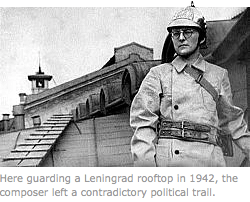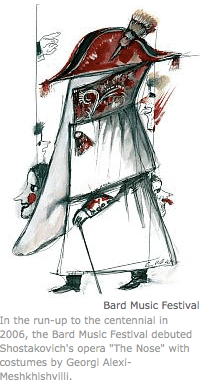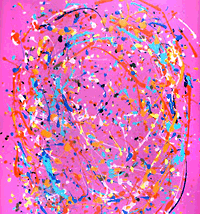Literature
Articles
A Discordant Legacy
A major U.S. music festival stirs up old debates about composer Dmitry Shostakovich's true identity.
The Moscow Times, August 13, 2006
Leon Trotsky once wrote that anyone with a hankering for the quiet life had made a mistake to be born in the 20th century. For some public figures who made that mistake, the 21st century has been no more tranquil.
One such person is Dmitry Shostakovich, whose life and output have once again become the subject of heated debate in anticipation of his centennial in 2006. It's a debate that began at the height of the Cold War and that is marked to this day with the cultural deceptions, false impressions and hidden agenda of those times. This Friday, the Bard Music Festival in upstate New York will re-air those tensions with a three-week program of concerts and talks as the polarized American musical community tries to get to the heart of the composer's identity. Was Shostakovich a Soviet loyalist or a dissident in disguise? What is written between his music's lines?
Throughout the composer's life and for half a decade after his death, Western musicians thought they knew the answer, accepting the official line that Shostakovich was a faithful Soviet citizen and interpreting his music accordingly. Then, in 1979, a text purporting to be the composer's dictated memoirs that had been smuggled out of the Soviet Union was published in the West -- written by a young musicologist named Solomon Volkov, who emigrated shortly thereafter.
In Volkov's "Testimony," we read that Shostakovich suffered under the communist dictatorship and that he deliberately reflected his revulsion toward Josef Stalin's brutal regime in his compositions, turning them into a musical commentary on the events he witnessed. "Testimony" portrays Shostakovich as a silent dissident, and not a communist marionette or Stalinist servant, as he had regularly been depicted in the Soviet and U.S. media.
This came as no news to Russian musical audiences, who had long detected an underlying dissidence in Shostakovich's music: "the contrapuntal commentary of an outraged humanity," as British music historian and journalist Norman Lebrecht wrote in a recent commentary. And the idea of a silenced genius fit in well with Cold War cultural politics. While party-line Soviet music historians hurriedly dismissed "Testimony" as a forgery, American musicologists such as the eminent Richard Taruskin took up its cause, greeting the memoirs as a sign of a new era in Shostakovich studies.
The book did usher in a new era, but its consequences were mixed. In 1980, the young musicologist Laurel Fay took the side of the Soviet establishment, dismissing the memoirs as a fake. Substantial passages of the memoirs had already appeared under Shostakovich's name in other Soviet publications long before Volkov's interviews with the composer took place, Fay pointed out. Many, including Taruskin, were swayed to her side.
Clashes between the revisionists and the counter-revisionists have been escalating ever since, with Taruskin, Fay and others insisting at various points that the composer was "perhaps Soviet Russia's most loyal musical son," "a wuss," and "a mediocre human being" who "toadied and cringed before his Soviet bosses," and Volkov supporters Allan B. Ho and Dmitry Feofanov making a case for the authenticity of "Testimony" in their 1998 book, "Shostakovich Reconsidered." Volkov, for his part, remained silent all these years, speaking out only once, at a 1999 conference at Mannes College of Music in New York, to call "Testimony" "an absolutely honest book."
 Over the past year, however, the controversy exploded again with a new book by Volkov and two collections of essays by members of the Fay camp. And on July 28, the Bard Music Festival heralded its upcoming retrospective, "Shostakovich and His World," with the East Coast premiere of the composer's opera "The Nose." Beginning Friday, the three-week program of music and lectures will feature works by Shostakovich both glorifying Stalin and reflecting the tragedies of life under the Soviet regime, and Taruskin and Fay, among others, are scheduled to speak. Conspicuously absent among the panelists, however, are Volkov, Ho and Feofanov, reflecting the general climate of unbridgeable division and polarization in the country as well as a continuing Cold War mentality.
Over the past year, however, the controversy exploded again with a new book by Volkov and two collections of essays by members of the Fay camp. And on July 28, the Bard Music Festival heralded its upcoming retrospective, "Shostakovich and His World," with the East Coast premiere of the composer's opera "The Nose." Beginning Friday, the three-week program of music and lectures will feature works by Shostakovich both glorifying Stalin and reflecting the tragedies of life under the Soviet regime, and Taruskin and Fay, among others, are scheduled to speak. Conspicuously absent among the panelists, however, are Volkov, Ho and Feofanov, reflecting the general climate of unbridgeable division and polarization in the country as well as a continuing Cold War mentality.
In her new collection, "A Shostakovich Casebook," Fay, who declined to answer questions for this article citing "several unfortunate experiences with interviewers," continues making her point that "Testimony" is not an authentic memoir.
"The problem with the memoirs is whether or not Shostakovich actually answered for them, and [after Fay's research] that case has now been solved," said Caryl Emerson, chair of the Slavic department at Princeton University and a panelist at the festival, in a telephone interview. The memoirs "are a good, interesting work by a knowledgeable music historian, but they are not the memoirs of Shostakovich. It was a book advertised under Shostakovich's name but not authorized by him. It was a marketing procedure in which American publishers were all too eager to cooperate."
Nevertheless, Emerson acknowledges, the publication of "Testimony" was an important event, if only because it varied the one-dimensional way in which Shostakovich had been viewed in both the East and the West.
 "There is no question even for those who doubt the authenticity of the memoirs that many of the opinions expressed there were legitimate opinions of both Shostakovich and the generation of Russian intelligentsia to which he belonged," she said. "The West was also a victim of the Soviet propaganda machine. Shostakovich was presented to us as a great communist composer, as he was presented to his own people. Yet surely he was, as are all geniuses, much more complex. It's important that the message got out, but the format [of 'Testimony'] has been exposed now for what it is."
"There is no question even for those who doubt the authenticity of the memoirs that many of the opinions expressed there were legitimate opinions of both Shostakovich and the generation of Russian intelligentsia to which he belonged," she said. "The West was also a victim of the Soviet propaganda machine. Shostakovich was presented to us as a great communist composer, as he was presented to his own people. Yet surely he was, as are all geniuses, much more complex. It's important that the message got out, but the format [of 'Testimony'] has been exposed now for what it is."
The dichotomy of artist as official spokesman and as private conscience of the era was a reality of life for creative people under Stalin. Shostakovich often proclaimed in his speeches his allegiance to the Soviet regime, and in 1973, he signed a letter denouncing Andrei Sakharov, the renowned physicist who had spoken out for human rights. Still, on his desk he kept a photograph of Gavril Glikman's painting portraying himself and Sergei Prokofiev in prisoner's clothes carrying a bucket to be used as a toilet. Though he had never been imprisoned, Shostakovich believed that this was the true representation of his life in the Soviet Union.
"People who didn't live through the Soviet time have a problem identifying with the way of life in the Soviet Union, its nuances and specificity," pianist and conductor Vladimir Ashkenazy, who wrote the foreword to the 25th-anniversary edition of "Testimony" published earlier this year, said in a recent telephone interview. "Inevitably, this leads to superficial conclusions about Shostakovich's life and music."
"Shostakovich is often blamed for his conformism and cowardice," Ashkenazy continued. "The irony is that if he hadn't played those conformist games, then we wouldn't be able today to discuss much of his work, simply because he could have easily ended his life in one of the labor camps."
Speaking by telephone from New York, Volkov declined to talk about "Testimony" but did make an argument that the Western attitude toward Shostakovich has largely been influenced by current musical fashion. "Statements about Shostakovich being Stalin's servant are vestiges of the negative attitude toward him as a composer," he said. "In America, he was considered a traditionalist in his use of the means of expression, a conformist. Today, however, it's no longer the deadliest sin to write in traditional form, since the time of avant-garde dictatorship has passed. Only now, there gradually comes the understanding that Shostakovich is a great musical figure."
Still, the controversy rages on, with the Bard Music Festival as its latest episode. According to Emerson, the Princeton professor, the debate has a larger purpose. "Occasionally, there are controversies that are important not so much for the questions they resolve, but the questions they raise," she said. "Both of our countries have terrible reflexes to overcome, and Shostakovich is, for better or worse, a very good focus for this."
Once again, Shostakovich and his music have become a unifying force. He would have appreciated the irony.
Featured Works:
Articles
Will Piano Lessons Make
My Child Smarter?
Lincoln Center Presents: Vita Nuova, a New Opera by Vladimir Martynov

